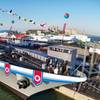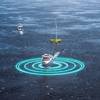First Steel Cut for Bibby WaveMaster
Following the recent contract signing for the first ever Damen Service Operations Vessel (SOV) with walk-to-work capability, the first steel was cut this week at Damen Shipyards Galati, marking the beginning of construction for U.K.-based client Bibby Marine Services.
The new vessel will be named Bibby WaveMaster 1 and deployed in the North Sea to support forthcoming offshore wind construction and O&M projects.
Damen Sr. Project Manager René Hooijman said, “This is a significant moment for this vessel and for both Damen and Bibby Marine Services. The beginning of the physical construction process is a cause for celebration after years of planning and development. The SOV is the result of extensive consultation within the offshore wind industry that has led to the design of a completely new concept from the hull up. It is therefore great to see the project come to life today with cutting of the first steel exactly according to planning. Assembly of the hull will start in April and the launch of the vessel is planned for early next year.”
The SOV design provides a bespoke solution for operators involved in the transfer and accommodation of offshore wind personnel. In consultation with its partners in the offshore industry, Damen identified demand for a vessel capable of remaining at sea for long periods of time while continuously deploying and retrieving engineers and support workers along with their equipment and components. Keeping the personnel in good shape throughout the mission and the ability to operate in a wide range of weather conditions were also factored into the design as key requirements.
To achieve these goals, the development program established that positioning the accommodation amidships, combined with a shallower draught made the vessel more stable, delivering optimal comfortable living conditions and more efficient dynamic positioning, Damen said.
Primary access to offshore structures is via a motion-compensated gangway. The vessel has been laid out in such a way that workflow is highly efficient, while remaining separated from accommodation areas, according to the builder. To ensure reliability and fuel efficiency, Damen refined the design leading to a reduction in installed power alongside increased redundancy.
The potential of the design was demonstrated at an early stage with a first-of-its-kind DP test at the Netherlands marine research institute MARIN. During these trials, a scale model was pitched against simulated, worst-case scenario North Sea conditions and exceeded all expectations.














